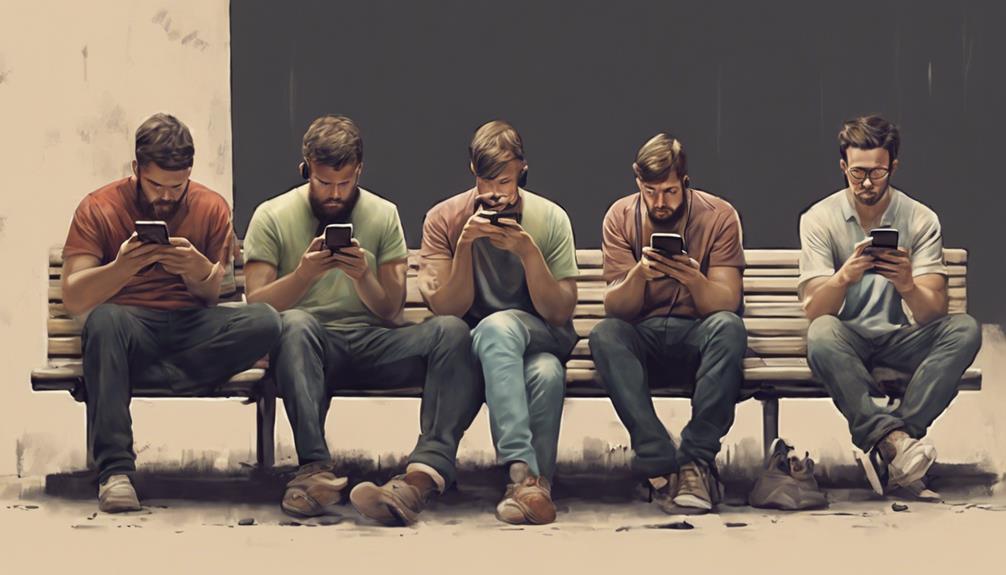The intricate interplay between technology and human relationships has become a prominent subject of analysis in contemporary society. As advancements in technology continue to shape the ways in which individuals connect and interact, questions arise regarding the true impact on the quality and depth of these relationships. From the evolution of communication methods to the nuanced influence on emotional connections, exploring the multifaceted dimensions of technology's role in shaping human relationships is essential in understanding our modern social landscape.
Key Takeaways
- Technology alters communication dynamics and methods, reshaping interactions.
- Digital tools can enhance or hinder emotional connections in relationships.
- Trust and privacy issues surface with technology's influence on relationships.
- Digital infidelity poses a threat to trust and intimacy in modern relationships.
Evolution of Communication Methods
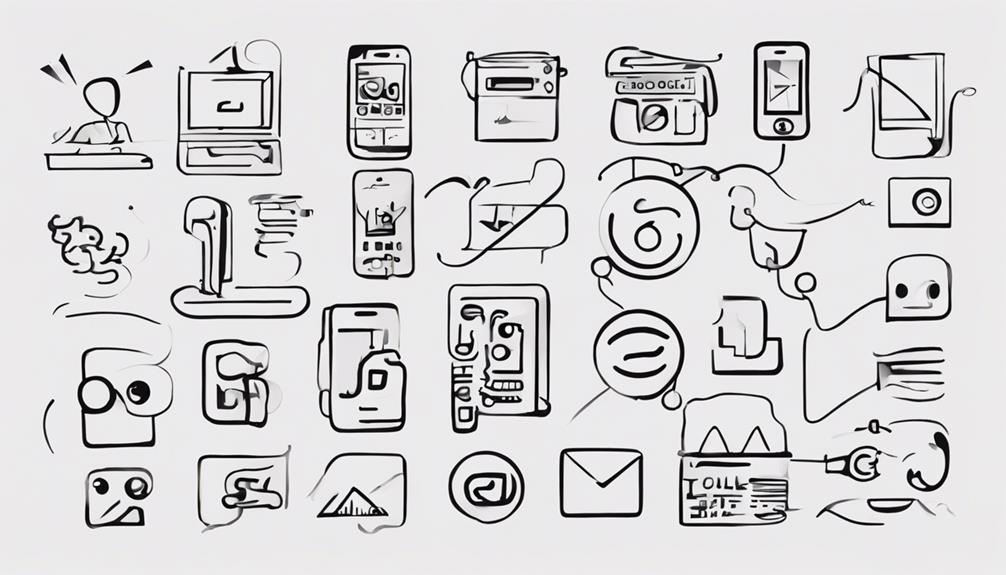
The evolution of communication methods has significantly transformed the way individuals interact and connect with one another, revolutionizing traditional means such as letters and telegrams to encompass instant messaging and video calls. Technology affects the dynamics of human relationships by providing diverse channels for communication, thereby enhancing the ease and speed of information exchange. This evolution has not only facilitated swift interactions but has also contributed to relationship strengthening by enabling individuals to stay connected more frequently and effectively. The advent of virtual communication platforms has allowed people to transcend physical boundaries, fostering connections on a global scale in real-time. In today's digital age, face-to-face interactions have been supplemented by a myriad of digital tools like email and texting, offering convenient alternatives for communication. These technological advancements have become integral in maintaining relationships, especially in scenarios where distance poses a challenge to traditional forms of interaction.
Influence on Social Interactions
In contemporary society, the pervasive integration of technology has undeniably altered the landscape of social interactions, manifesting in various concerning trends and impacts on interpersonal relationships. The influence of technology on social interactions is evident through statistics showing that 88% of people agree that technoference is a significant problem, disrupting the quality time spent with loved ones. Furthermore, 70% of individuals report that technology interrupts family time occasionally, affecting the depth of their social interactions. In marriages, 45% view technology as a significant issue, which directly impacts their social connections with their partners. Even intimate social interactions are not immune, as 25% feel that their partner's tech use in bed interferes with their sexual relationship. Additionally, 38% admit to using technology while eating with family, indicating how it hinders social bonding during meals.
| Impact of Technology on Social Interactions | Statistics |
|---|---|
| Technoference | 88% |
| Interruption of family time | 70% |
| Impact on marriages | 45% |
| Influence on intimate relationships | 25% |
| Disruption during family meals | 38% |
Impact on Emotional Connections

Studies suggest that technology may lead to a decrease in empathy due to the lack of face-to-face interactions and non-verbal cues. Virtual intimacy challenges arise when digital communication replaces traditional forms of emotional connection. Misunderstandings in digital communication can hinder the depth and authenticity of emotional bonds between individuals.
Decrease in Empathy
Excessive engagement with technology has been linked to a notable decline in empathetic responses within interpersonal relationships. This decrease in empathy is attributed to several factors:
- Reduced Emotional Connections: Research shows that constant technology use can lead to a decrease in emotional connections between individuals.
- Lack of Emotional Depth: Digital communication often lacks the emotional depth present in face-to-face interactions, affecting the empathy shared in relationships.
- Diminished Understanding: Over-reliance on technology can diminish individuals' ability to understand and empathize with the feelings of others.
- Hindered Empathy Development: Decrease in face-to-face interactions due to technology usage can hinder the development of empathy in relationships.
Virtual Intimacy Challenges
The detrimental impact of technology on human empathy has now shifted focus towards exploring the challenges posed by virtual intimacy on emotional connections within relationships. Virtual interactions, lacking nonverbal cues, can hinder the accurate reflection of individuals' true selves, potentially impacting emotional connections. The absence of emotional nuances in digital platforms challenges the authenticity of relationships, raising questions about the genuineness of online connections. Misinterpretations are common in virtual communication, leading to misunderstandings that may negatively affect emotional bonds. The limitations of virtual interactions create obstacles in establishing deep emotional connections, highlighting the complexities of maintaining authentic relationships in the digital age. As technology continues to shape how we interact, understanding and navigating these challenges are crucial for fostering genuine emotional connections in virtual settings.
Digital Communication Misunderstandings
Digital communication misunderstandings can significantly impact the emotional connections between individuals, leading to potential strains in relationships due to the lack of nonverbal cues. When analyzing the impact of digital communication on emotional connections, several key points emerge:
- Misunderstandings in digital communication can lead to emotional disconnection.
- The absence of nonverbal cues in digital interactions can result in misinterpretations and strained relationships.
- Assessing emotional nuances accurately in online communication can be challenging, affecting emotional connections.
- The authenticity of relationships may be questioned due to the limitations of digital communication.
These factors highlight the importance of understanding the nuances of digital communication to foster and maintain strong emotional connections in relationships.
Changes in Relationship Dynamics

The impact of technology on human relationships has led to significant shifts in communication dynamics, affecting the way individuals interact and connect with each other. Issues surrounding trust and privacy have become increasingly prevalent as technology blurs boundaries and raises concerns about data security and personal information sharing. Furthermore, the evolution of emotional connections in the digital age raises questions about the authenticity and depth of relationships formed through technological platforms.
Communication Shifts
Communication shifts in human relationships, influenced by technological advancements, have brought about significant alterations in how individuals interact and connect with one another. When it comes to digital communication tools, misinterpretation can easily arise, leading to misunderstandings and conflicts. However, text-based communication can have a positive impact during conflicts, allowing for more thoughtful responses. Additionally, technology enables partners to stay connected constantly, facilitating the sharing of daily experiences and emotions. Setting reminders through digital tools can also play a role in offering support and strengthening the bond between individuals. Despite the potential for disagreements due to miscommunication, implementing strategies for effective resolution can help maintain healthy relationships in the digital age.
Trust and Privacy
In the realm of human relationships, the evolution of technology has brought about significant shifts in trust and privacy, fundamentally altering the dynamics between individuals. Trust in relationships can be compromised by issues such as online privacy breaches and digital infidelity. Privacy concerns often stem from the sharing of personal information on social media and communication platforms. Changes in relationship dynamics are evident due to the increased monitoring and tracking capabilities facilitated by technology. Moreover, digital communication tools can introduce misunderstandings and challenges in maintaining trust and intimacy. Therefore, finding a balance between leveraging the convenience of technology and actively fostering trust is crucial for the sustenance of healthy relationships.
| Trust | Privacy | Digital Infidelity |
|---|---|---|
| Affected by tech | Personal info sharing | Breach of trust |
| Monitoring tech | Online privacy breaches | Emotional infidelity |
| Misunderstandings | Tracking capabilities | Communication challenges |
| Relationship building | Balancing convenience | Technology-enabled cheating |
| Maintaining intimacy | Privacy concerns | Trust erosion |
Emotional Connection
Examining the impact of technology on emotional connections within human relationships reveals a complex interplay between digital interactions and genuine intimacy. In the digital age, individuals face challenges in maintaining emotional connection due to the influence of technology. To navigate these complexities, setting boundaries is essential to preserve emotional intimacy. This involves establishing limits on technology use to prioritize in-person interactions and deepen emotional bonds. By balancing digital communication with face-to-face conversations, individuals can foster authentic emotional connections and prevent emotional detachment. Misinterpretations that may arise from digital communication can be mitigated by emphasizing the importance of genuine emotional expression in relationships. Balancing technology use with emotional connection is paramount in navigating the evolving landscape of human relationships.
Role of Social Media Platforms
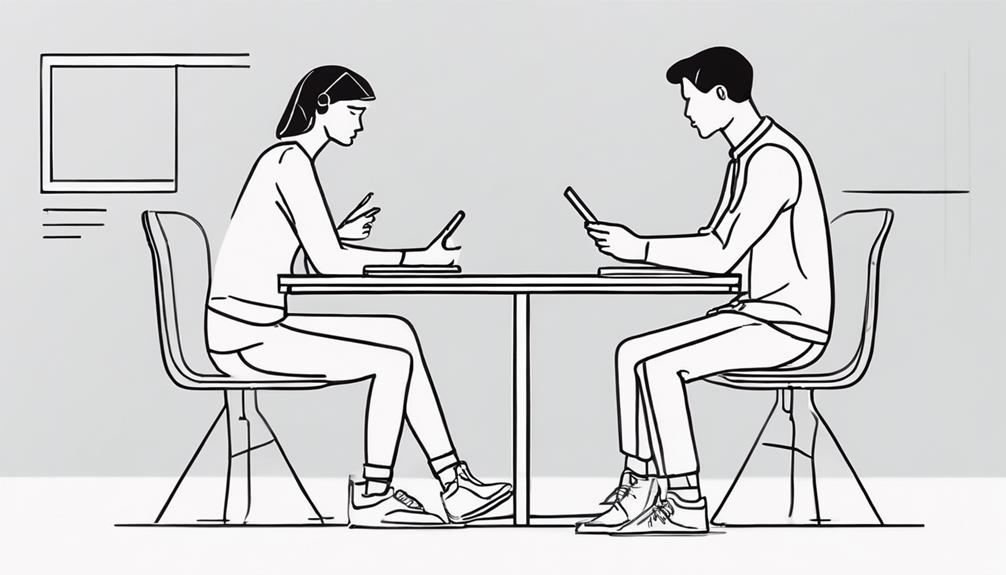
The influence of social media platforms on human relationships is profound, shaping perceptions, behaviors, and dynamics within interpersonal connections. These platforms often serve as stages for individuals to present curated highlight reels of their lives, showcasing only the positive aspects. This selective portrayal can lead to feelings of inadequacy and comparison among users, potentially straining relationships. The pressure to maintain a certain image online may create unrealistic expectations and hinder authentic communication. Moreover, the fear of missing out (FOMO) induced by social media can negatively impact relationships by causing individuals to prioritize virtual interactions over real-life connections. The distortion of reality on social media raises questions about the authenticity of online relationships and the extent to which they reflect individuals' true selves. Therefore, while social media platforms offer avenues for connection, they also introduce challenges that require users to navigate carefully to maintain healthy and genuine relationships.
Effects on Family Bonds
The pervasive integration of technology into daily familial interactions raises concerns about its impact on the cohesion and dynamics of family bonds. This phenomenon is evidenced by statistics showing that 70% of individuals report technology interruptions during family time and 30% use devices while eating at home with their families. Such behaviors can lead to negative impacts on family bonds, as concerns about reduced time spent together and increased feelings of depression and anxiety are prevalent. Moreover, the trend extends beyond the home, with 35% of individuals admitting to using technology while dining out with a partner. Concerningly, 6 out of 10 adults express worries about the effects of technology on children within the family unit. These findings underscore the need for a balanced approach to technology use within families to safeguard the quality of relationships and preserve meaningful interactions.
Technology's Role in Intimacy
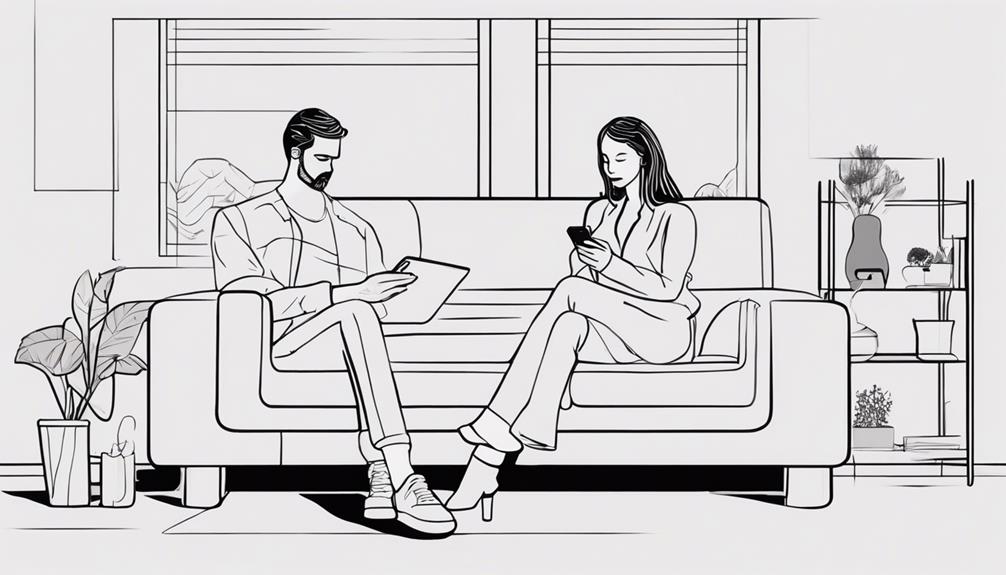
In the realm of interpersonal relationships, technology plays a pivotal role in shaping and enhancing intimacy between individuals. Through video calls, messaging platforms, and social media, technology enables intimate connections, allowing partners in long-distance relationships to maintain a sense of closeness. These digital tools not only facilitate communication but also strengthen emotional bonds by providing constant channels for expression and support. Moreover, online therapy platforms offer a unique avenue for couples to address intimacy issues and work through relationship challenges, further deepening their connection.
Virtual interactions, made possible by technology, can foster intimacy by bridging physical gaps and offering opportunities for meaningful engagement. Despite geographical separation, couples can utilize technology to maintain and even strengthen their emotional connection. By leveraging the benefits of virtual interactions, individuals can nurture and sustain intimate relationships, demonstrating the positive impact of technology in enhancing intimacy and emotional bonds in modern-day relationships.
Challenges in Maintaining Connections
Amidst the pervasive integration of technology in daily life, the prevalence of technoference presents a noteworthy challenge to maintaining meaningful human connections. This challenge manifests in various ways, impacting relationships on different levels:
- 88% of people agree that technoference is a significant problem in society, affecting human relationships by creating barriers to genuine communication and connection.
- 45% of individuals view technology as a significant issue in their marriage, highlighting the challenges in maintaining connections within intimate partnerships.
- 25% feel that their partner's tech use in bed interferes with their sexual relationship, underscoring how technology can disrupt intimacy and closeness.
- 70% report that technology interrupts family time occasionally, affecting the quality of connections within families and potentially weakening bonds between family members.
These statistics underscore the tangible impact of technology on human relationships, emphasizing the need for conscious efforts to mitigate technoference and cultivate genuine connections in the digital age.
Implications for Mental Health
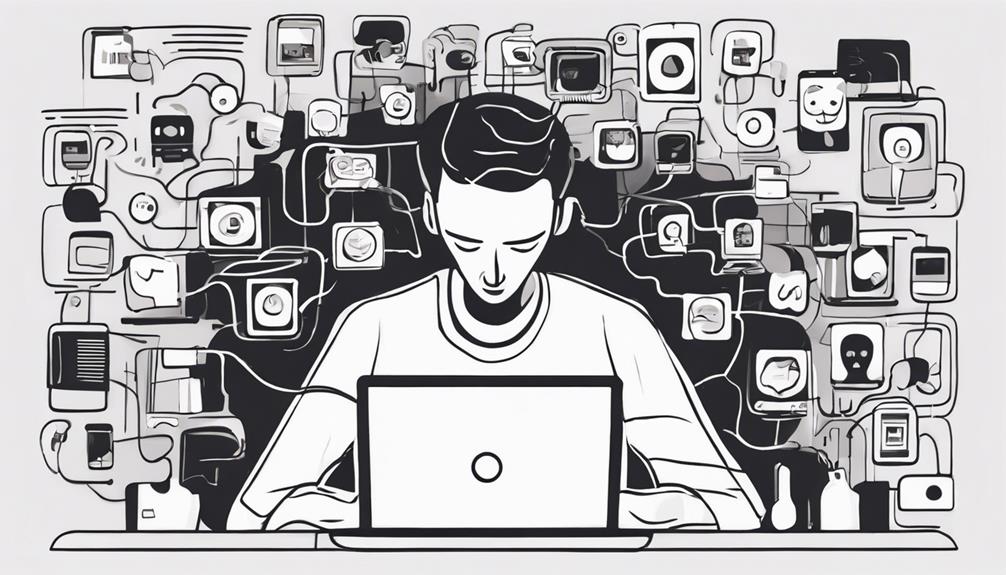
The implications of technology on mental health encompass various aspects such as the effects of excessive screen time, the tendency to compare oneself to others on social media platforms, and the potential for increased feelings of loneliness and isolation. These factors are supported by research indicating the negative impact of technology on mental well-being, highlighting the need for individuals to actively manage their use of technology to maintain good mental health. Acknowledging these points can guide individuals in making informed decisions about their tech consumption to safeguard their mental well-being in the digital age.
Screen Time Effects
Excessive screen time has been unequivocally associated with heightened rates of anxiety and depression, indicating a significant impact on individuals' mental health. When considering the effects of screen time on mental health conditions, it becomes evident that this aspect of technology can have detrimental consequences, such as negative impacts on relationships. To navigate this issue effectively, individuals should be aware of the following key points:
- Increased screen time is linked to higher levels of anxiety and depression.
- Studies demonstrate a clear correlation between extensive screen time usage and negative mental health outcomes.
- Prolonged exposure to screens can lead to adverse effects on emotional well-being and relationships.
- Limiting screen time has been shown to positively influence mental health and enhance overall relationship quality.
These findings emphasize the importance of balancing technology use to promote healthier relationships.
Social Media Comparison
In the realm of human relationships influenced by technology, the phenomenon of social media comparison emerges as a significant factor impacting mental health outcomes. Studies, such as the one published in the Indian Journal of Psychological Medicine, reveal that 54% of individuals experience feelings of anxiety or depression after comparing their lives on social media. This comparison often triggers a sense of inadequacy, leading to strained relationships. The pressure to curate a perfect online image can detrimentally affect mental health and overall well-being. Additionally, the fear of missing out (FOMO) resulting from social media comparisons can further impact relationships. By showcasing only the positive aspects of life, social media platforms can create unrealistic expectations, contributing to negative mental health implications within relationships.
Loneliness and Isolation
Technology-mediated interactions have been linked to heightened levels of loneliness and isolation, posing significant implications for mental health outcomes. Studies indicate that excessive screen time and heavy social media use can lead to feelings of disconnection and social isolation, negatively impacting emotional well-being. Here are four key points to consider:
- Increased technology use correlates with higher levels of loneliness and isolation.
- Heavy social media use can contribute to feelings of loneliness and disconnectedness.
- Technology-driven interactions may not fully satisfy the need for meaningful face-to-face connections, potentially leading to increased loneliness.
- Individuals heavily reliant on technology for social interactions may experience a sense of isolation, which can further impact mental health.
Balancing Virtual and Real Relationships
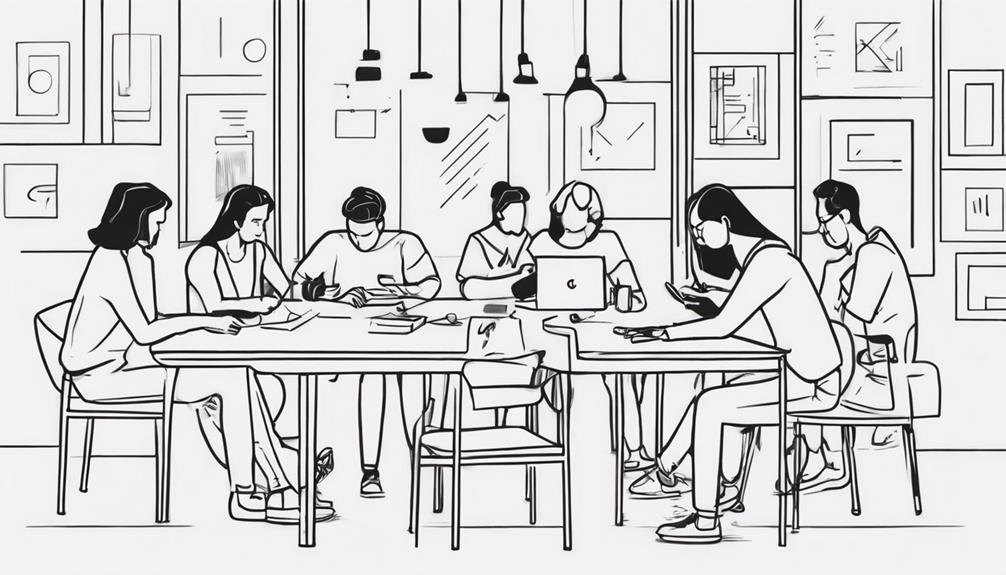
Maintaining a healthy balance between virtual interactions and in-person connections is crucial for fostering meaningful human relationships. While technology plays a significant role in modern relationships, excessive reliance on it can detract from the quality of face-to-face interactions. Positive impacts on relationships stem from balancing virtual communication with meaningful in-person exchanges. Emotional intimacy and trust are nurtured through in-person interactions, where active listening and resolving misunderstandings strengthen communication skills and enhance relationship dynamics. Prioritizing genuine human connections over virtual ones can help in reducing emotional support dependence on technology. Setting boundaries on technology use and being fully present during face-to-face interactions are essential steps in improving the quality of real-life relationships. By recognizing the importance of both virtual and real relationships and actively working towards a healthy equilibrium between the two, individuals can cultivate deeper connections and enrich their overall relationship experiences.
Impact on Empathy and Understanding
The escalating prevalence of technology in modern society has been accompanied by concerning trends indicating a decline in empathy levels among individuals, particularly evident in college students over the past three decades. This decline can be attributed to various factors, including the impact of digital communication and the reduced emphasis on interpreting nonverbal cues. To understand this phenomenon better, consider the following:
- Empathy Levels: Studies show a decrease in empathy levels among college students, potentially associated with increased technology use.
- Digital Communication: Overreliance on digital communication methods may result in a diminished understanding of emotions conveyed through nonverbal cues.
- Emotional Intelligence: Excessive screen time is linked to hindered development of empathy and interpersonal skills, especially in younger age groups.
- Interpersonal Relationships: Virtual interactions often lack the depth needed to accurately interpret emotions, leading to a decrease in empathy within relationships.
These insights highlight the critical need to address the impact of technology on empathy and understanding in human relationships, emphasizing the importance of balancing digital interactions with meaningful face-to-face connections.
Addressing Communication Misunderstandings
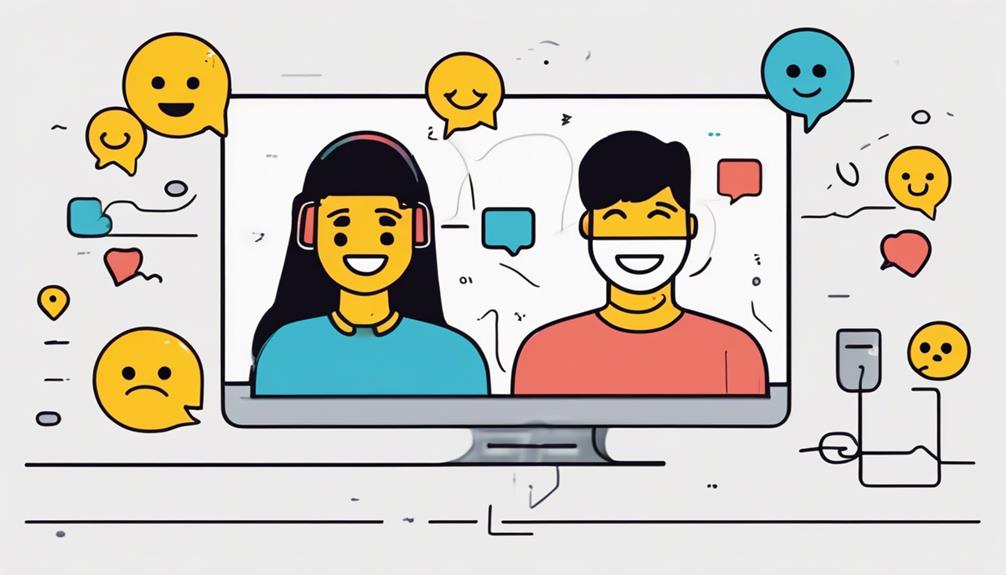
Effective communication in modern relationships is often challenged by the limitations of text-based interactions, leading to potential misunderstandings and conflicts. Unlike face-to-face conversations, digital communication lacks crucial nonverbal cues such as tone of voice, facial expressions, and body language, making it easier for messages to be misinterpreted. This can result in tensions and disagreements between partners, as the intended meaning may not always be accurately conveyed through text alone. To address communication misunderstandings in digital interactions, employing effective communication strategies is essential. Partners can clarify messages, ask for feedback, and avoid making assumptions to ensure mutual understanding. Additionally, utilizing technology to set reminders for important conversations or check-ins can provide support and strengthen the emotional connection between partners. By acknowledging the limitations of text-based communication and actively implementing strategies to enhance understanding, couples can navigate disagreements arising from miscommunication and foster healthier relationships in the digital age.
Nurturing Healthy Digital Relationships
Given the prevalence of digital communication in modern relationships and its potential for misunderstandings, fostering healthy connections in the digital realm requires a strategic and intentional approach. When nurturing healthy digital relationships, consider the following:
- Establish Clear Communication Channels: Utilize technology to maintain open and honest communication, ensuring that both partners feel heard and understood.
- Set Boundaries: Define boundaries on technology usage to prioritize quality time together and prevent digital distractions from interfering with the relationship.
- Utilize Technology for Support: Leverage technology to provide emotional support and reminders to show care and strengthen the bond between partners.
- Seek Professional Help: Online therapy services like Regain can be beneficial for addressing mental health issues and enhancing the overall quality of the relationship.
Frequently Asked Questions
What Is the Impact of Technology on Human Relationship?
Technological advancements have significantly altered human relationships, impacting social interactions, communication, trust, and intimacy. The widespread use of social media has reshaped how individuals connect, often substituting face-to-face interactions with virtual connections. This shift raises concerns about the depth of relationships and the erosion of trust and intimacy. As technology continues to evolve, understanding its role in shaping human connections is crucial for maintaining healthy and meaningful relationships.
Does Technology Have an Impact on Relationships?
In the realm of human relationships, technology wields a double-edged sword, influencing trust-building, emotional intimacy, and communication barriers. The digital age's ubiquity challenges traditional relationship dynamics, fostering both connection and disconnection. Trust can be nurtured or eroded through virtual interactions, emotional intimacy can deepen or stagnate in the face of screens, and communication barriers can either be bridged or fortified by the very tools meant to enhance connectivity.
How Does Technology Affect Human Interaction?
Technology affects human interaction in various ways. Social media can lead to increased feelings of loneliness due to superficial connections. Virtual communication, while convenient, can hinder intimacy and genuine emotional connection. Online dating platforms have altered how individuals form relationships, sometimes leading to more shallow connections. Overall, technology has reshaped the landscape of human interaction, offering both benefits and challenges in fostering meaningful relationships and maintaining genuine connections.
How Technology Has a Positive Impact on Relationships?
Improved communication, strengthened connections, and increased intimacy are some of the positive impacts of technology on relationships. A study by Pew Research Center found that 82% of long-distance relationships use technology to maintain communication, showcasing its vital role. Through real-time interactions and online platforms, individuals can bridge geographical barriers, fostering deeper connections and enhancing intimacy. Technology acts as a facilitator, enabling constant communication and interaction, thereby positively influencing relationships.
Conclusion
In conclusion, the impact of technology on human relationships is a double-edged sword, with both advantages and challenges. It has transformed communication methods, influenced social interactions, and changed relationship dynamics. Balancing virtual and real relationships is crucial in navigating the complexities of the digital age. It is essential to address communication misunderstandings and nurture healthy digital relationships to foster empathy and understanding. As the saying goes, "technology is a tool, not a replacement for genuine connection."
